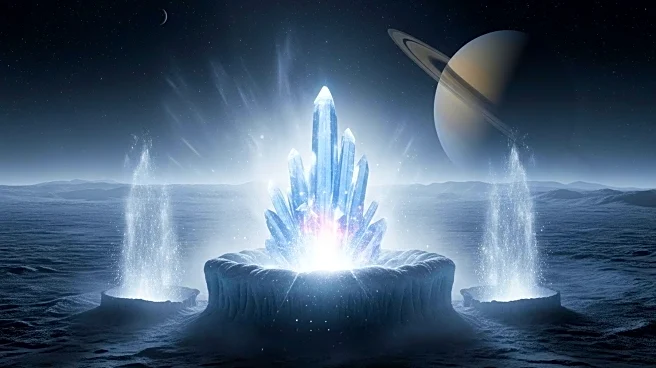What's Happening?
Researchers have discovered new organic compounds on Enceladus, one of Saturn's moons, using data from the Cassini probe. These compounds, found in ice fragments ejected from the moon's subsurface ocean, suggest complex chemical reactions may be occurring beneath its icy crust. The study, published in Nature Astronomy, highlights Enceladus's potential to harbor life, as it possesses liquid water, an energy source, and essential elements. The findings expand the range of known organic molecules on Enceladus, reinforcing the hypothesis of hydrothermal processes generating rich organic chemistry.
Why It's Important?
The discovery of new organic compounds on Enceladus is crucial for astrobiology, as it strengthens the case for the moon's habitability. Enceladus's environment, with its subsurface ocean and hydrothermal activity, offers conditions conducive to life. This research could shift the focus of extraterrestrial life searches from Mars to icy moons, which may provide more favorable conditions for life. The findings could also influence future space missions, prioritizing Enceladus as a target for habitability studies and potential life detection.
What's Next?
The confirmation of organic compounds on Enceladus may lead to increased interest in missions to explore the moon further. Future missions could aim to directly sample the subsurface ocean and analyze its chemical composition, providing more definitive evidence of life. The development of advanced technologies for space exploration, such as improved propulsion systems, could facilitate these missions, making distant moons more accessible. International collaboration may be necessary to pool resources and expertise for comprehensive exploration of Enceladus.
Beyond the Headlines
The discovery on Enceladus could redefine our understanding of where life might exist in the universe, highlighting the potential of icy moons as habitats. Ethical considerations regarding the contamination of alien worlds could be less contentious on Enceladus, as it is not a target for human colonization. The findings may also inspire new scientific inquiries into the origins of life and the conditions necessary for its development, influencing research across multiple disciplines.












